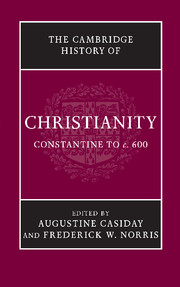Book contents
- Frontmatter
- Introduction
- Part I Christianity: Regional Developments
- Part II Christianity Contested
- Part III Christian Culture and Society
- 13 Towards defining a Christian culture: The Christian transformation of classical literature
- 14 Bishops and society
- 15 Synods and councils
- 16 The growth of church law
- 17 The church, society and political power
- Part IV Christian Beliefs and Practices
- Index
- Map 1 The Roman empire, c. 400">
- References
13 - Towards defining a Christian culture: The Christian transformation of classical literature
from Part III - Christian Culture and Society
Published online by Cambridge University Press: 28 March 2008
- Frontmatter
- Introduction
- Part I Christianity: Regional Developments
- Part II Christianity Contested
- Part III Christian Culture and Society
- 13 Towards defining a Christian culture: The Christian transformation of classical literature
- 14 Bishops and society
- 15 Synods and councils
- 16 The growth of church law
- 17 The church, society and political power
- Part IV Christian Beliefs and Practices
- Index
- Map 1 The Roman empire, c. 400">
- References
Summary
The culture of late antiquity was a curious blend of classical pagan forms and newly developed Christian ones. This chapter deals solely with aspects of late antique literary culture, and investigates the degree to which the rise of Christianity impacted traditional Greco-Roman literary forms. Christian writers took various attitudes towards their Hellenistic literary and philosophical inheritance. The literary production of the mid-fourth to sixth centuries will be considered according to genre. I will examine the individual approaches to each genre by six church fathers, who wrote in Greek or Latin. Finally I will briefly consider the effect of the eastern expansion of Christian culture on the Syriac, Armenian and Coptic communities, which were somewhat freer from the constraints of the Hellenistic heritage.
Introduction
The Christian authors of the fourth to sixth centuries whose work survives achieved a remarkable synthesis of Greco-Roman rhetoric and philosophy, which had its origins in Athens in its golden age, the fourth and fifth centuries bc, the age of Plato and Aristotle. It is indisputable that late ancient literary culture was shaped by these early Hellenic influences. The reception of the philosophical thought of Plato and Aristotle in Neo- and Middle Platonism and Stoicism was profoundly influential on all the Christian writers whose work is examined below. Not only was the philosophical tradition inherited by the teachers and writers of the newly created fourth-century Christian Roman empire of profound consequence, but the forms of literary expression first adopted by the Greeks, and developed by their Roman imitators, lived on in various forms within almost all the genres of late antique Christian literature.
Keywords
- Type
- Chapter
- Information
- The Cambridge History of Christianity , pp. 315 - 342Publisher: Cambridge University PressPrint publication year: 2007

